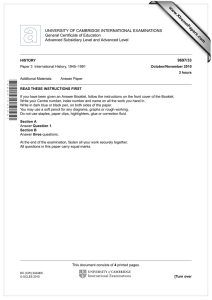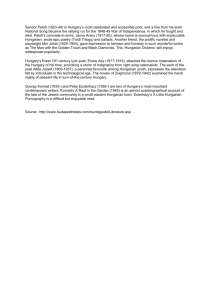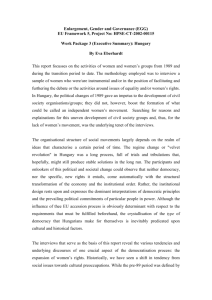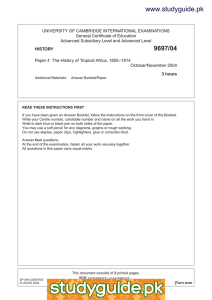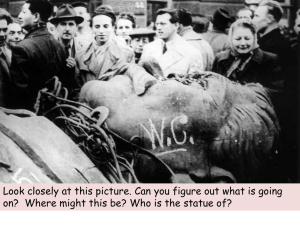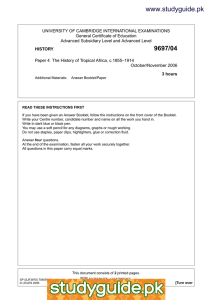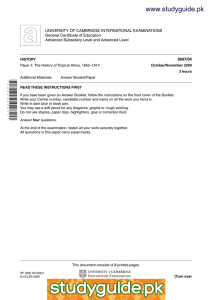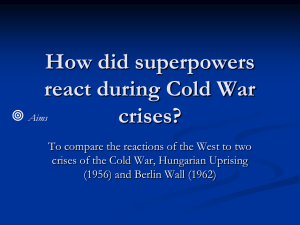www.studyguide.pk
advertisement
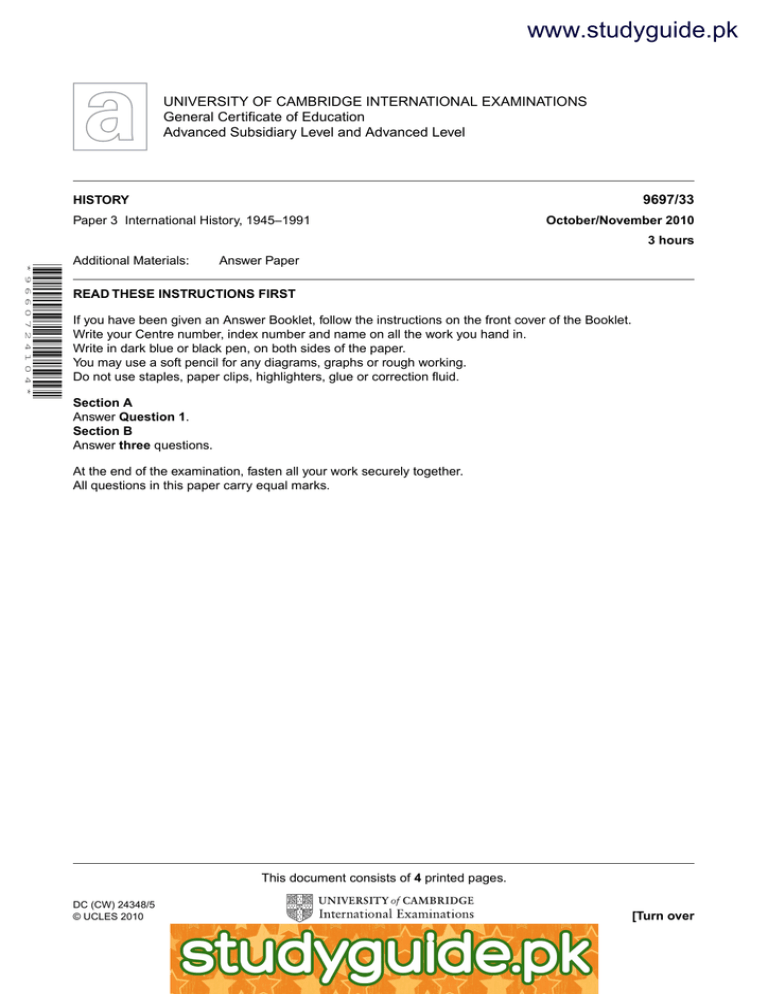
www.studyguide.pk UNIVERSITY OF CAMBRIDGE INTERNATIONAL EXAMINATIONS General Certificate of Education Advanced Subsidiary Level and Advanced Level 9697/33 HISTORY Paper 3 International History, 1945–1991 October/November 2010 3 hours *9660724104* Additional Materials: Answer Paper READ THESE INSTRUCTIONS FIRST If you have been given an Answer Booklet, follow the instructions on the front cover of the Booklet. Write your Centre number, index number and name on all the work you hand in. Write in dark blue or black pen, on both sides of the paper. You may use a soft pencil for any diagrams, graphs or rough working. Do not use staples, paper clips, highlighters, glue or correction fluid. Section A Answer Question 1. Section B Answer three questions. At the end of the examination, fasten all your work securely together. All questions in this paper carry equal marks. This document consists of 4 printed pages. DC (CW) 24348/5 © UCLES 2010 [Turn over www.XtremePapers.net www.studyguide.pk 2 SECTION A: THE DEVELOPMENT OF THE UNITED NATIONS, 1945–1991 You must answer Question 1. THE UNITED NATIONS AND THE HUNGARIAN UPRISING OF 1956 1 Read the Sources and then answer the question. When answering Question 1 candidates are advised to pay particular attention to the interpretation and evaluation of the Sources both individually and as a group. Source A The United Nations has called upon the USSR to withdraw its forces from Hungary. Soviet troops are here for the purpose of restoring law and order and at the request of the Hungarian Government. We cannot permit UN observers to enter Hungary. The events which took place on 22 October 1956 and thereafter are exclusively within the domestic jurisdiction of the Hungarian People’s Republic and consequently do not fall within the jurisdiction of the United Nations. Response to a UN Resolution by the Government of the Hungarian People’s Republic, 28 October 1956. Source B The Hungarian uprising inspired in our nation feelings of sympathy and admiration for the rebels, anger and distrust for their Soviet oppressors. No one shared these feelings more keenly than I; indeed, I still wonder what would have been my recommendation to the Congress and the American people had Hungary been accessible by sea, or through the territory of allies who might have agreed to react positively to any attempt to help prevent the fate of the Hungarian people. Unless the major nations of Europe would, without delay, ally themselves spontaneously with us (an unimaginable prospect), we could do nothing. Sending US troops alone into Hungary through hostile or neutral territory would have involved us in general war. Though the General Assembly passed a resolution calling upon the Soviets to withdraw their troops, it was obvious that no mandate for military action could or would be forthcoming. I realised that there was no use going further into this possibility. Former US President Eisenhower in his memoirs, 1969. Source C Although the United States had anticipated a revolt in Hungary, and had indeed encouraged it through Voice of America and Radio Free Europe broadcasts and through CIA-created underground resistance cells within Eastern Europe, when the revolt actually came the government had no plans prepared. There was a good reason for this – there was nothing the United States could do anyway. Hungary was surrounded by Communist states, plus neutral Austria, and had a common border with the Soviet Union. It had no ports. There was almost no trade going on between the US and the Russians. There was no pressure, save for public opinion, that President Eisenhower could bring to bear on the Soviets in Hungary. He knew it, had known it all along, which made all his talk about ‘liberation in Europe’ so essentially hypocritical. An American historian, writing in 1984. © UCLES 2010 9697/33/O/N/10 www.XtremePapers.net www.studyguide.pk 3 Source D In the days before the Israeli attack on Egypt (29 October 1956), the representatives of the USA, Britain and France agreed that Soviet intervention in Hungary must be unambiguously condemned in public but that, given the difficulties of finding out what was really going on in Hungary, ‘wait and see’ tactics should be employed for the time being. Following the escalation of the Middle Eastern conflict on 31 October when British and French forces joined the fray, the character of negotiations concerning Hungary completely changed. From then on, the real aim of the negotiating partners was no longer the condemnation of Soviet intervention, let alone putting obstacles in its way; they wanted rather to exploit the Hungarian crisis to advance their own conflicting great-power interests. From then on, the British and French wanted to transfer the Hungarian question from the Security Council to a special session of the General Assembly convened to discuss the Suez crisis. They hoped that the joint discussion of the two international crises would significantly improve their position. The American administration, looking on a solution to the Middle Eastern crisis as their sole objective, did everything in their power to cross the Anglo-French plan. Indeed, they succeeded in preventing the Hungarian issue being referred to the special session of the General Assembly before the second Soviet intervention. A Hungarian historian, writing in 2000. Source E The truth is that during the Hungarian Revolution of 1956, the US government, under President Eisenhower, acted with astonishing timidity by not reacting with firmness to stand up to the Soviet Union in defence of Hungary. The US had strategic bombers that could have been flown to Great Britain to send a warning to the Soviets; it could have deployed an aircraft carrier to the Adriatic Sea to threaten air strikes against Soviet forces; it could have refrained from instructing US Ambassador to the UN, Henry Cabot Lodge, to declare at the UN that the Hungarians and the Soviets will resolve the crisis together and alone. It is important to remember that the US enjoyed total nuclear superiority over the Soviet Union in 1956, with the ability to deliver nuclear warheads into Soviet territory. In this regard, Eisenhower could have threatened the Russians to back off and let Hungary become a neutral country. But Eisenhower was too cautious to dare take a step in support of freedom. Khrushchev himself pointed out that Eisenhower was ‘a good man, but he wasn’t very tough’. From an article by a Hungarian-American academic, 2003. Now answer the following question. How far do Sources A–E support the view that US President Eisenhower was responsible for the UN’s failure to take more effective action over the Hungarian Crisis? © UCLES 2010 9697/33/O/N/10 www.XtremePapers.net [Turn over www.studyguide.pk 4 SECTION B You must answer three questions from this section. You must not answer both Question 3 and Question 4. 2 To what extent was the Truman Doctrine a turning-point in the development of the Cold War in the years from 1945 to 1949? 3 ‘The Cold War did not become truly global until after the Cuban Missile Crisis of 1962.’ How far do you agree? OR 4 ‘The US played a much more significant role than the USSR in the Arab-Israeli Conflict in the years from 1948 to 1991.’ How far do you agree? 5 How far did the collapse of communist rule in Eastern Europe in 1989 cause the collapse of the USSR in 1991? 6 How far did nuclear weapons provide international stability during the Cold War? 7 To what extent was the growth of the global economy from 1945 to 1991 the result of the increasing adoption of free trade policies? 8 How far was the success of the Asian Tiger economies the result of government policies? Copyright Acknowledgements: Source A Source B Source C Source D Source E © www.hungarian-history.hu; 13 October 2009. © Dwight D Eisenhower; In Review ;1969. © Stephen Ambrose; Eisenhower Vol.2 ; The P resident; 1984. © www.rev.hu/portal/page/portal/rev/tanulmanyok/1956/hungquest. © www.hungaria.org. Permission to reproduce items where third-party owned material protected by copyright is included has been sought and cleared where possible. Every reasonable effort has been made by the publisher (UCLES) to trace copyright holders, but if any items requiring clearance have unwittingly been included, the publisher will be pleased to make amends at the earliest possible opportunity. University of Cambridge International Examinations is part of the Cambridge Assessment Group. Cambridge Assessment is the brand name of University of Cambridge Local Examinations Syndicate (UCLES), which is itself a department of the University of Cambridge. © UCLES 2010 9697/33/O/N/10 www.XtremePapers.net
